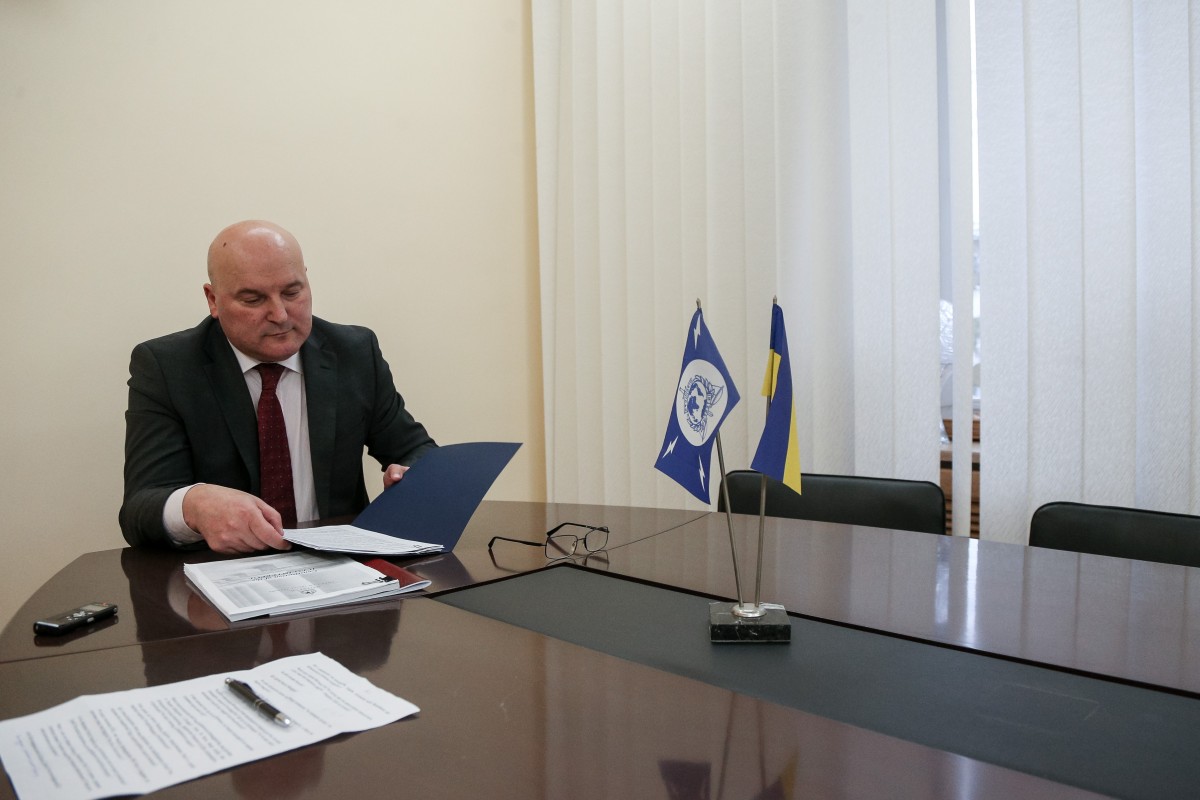
Head of Ukraine's Interpol, Europol Bureau Vasyl Nevolya: "We have a mechanism to turn down extradition requests"
Chief of the Ukrainian National Central Bureau of Interpol and Europol Vasyl Nevolya sat down with UNIAN to explain, why it is almost impossible to ensure through Interpol channels the extradition to Ukraine of some high-ranking officials - from Viktor Yanukovych to Oleksandr Onyschenko, why Ukraine continues to cooperate with the Russian NCB, and whether there are mechanisms to prevent to hand over to Russia participants of the Anti-Terrorist Operation with Russian citizenship.
Recently, the words "Interpol" and "extradition" have become more prominent in the Ukrainian media space. It was mostly due to a recent scandal involving an operative of Kyiv PD working on Interpol and Europol related issues. The policeman is reported to have been complicit in kidnapping an individual and extorting tens of thousands of hryvnias. Another interesting case was a "voluntary extradition" from Panama to Ukraine of a high-profile former head of the State Agency for Investments (who held office at the times of Yanukovych) Vladyslav Kaskiv, whom the Ukrainian law enforcers suspected of embezzlement and counterfeiting, and whom the Ukrainian court has subsequently released on bail.
Unfortunately, it was before the events mentioned that UNIAN spoke with the head of Interpol and Europol Department of the National Police of Ukraine, General Vasyl Nevolya. However, besides Kaskiv's case, on which the news agency’s interlocutor did not elaborate because "it is ongoing, let's wait for its completion", Gen. Nevolya told about the inability to use Interpol's tools in the cases of Yanukovych and Co., the problem of the extradition to Ukraine of Oleksandr Onyshchenko, the cooperation with the Russian NCB of Interpol and the reasons Ukraine needs it, as well as whether there are any instruments for Ukraine not to hand over to Russia ATO participants with Russian citizenship.
Which of the Ukrainian ex-officials, judges, and security operatives of the Yanukovych era still remain on the Interpol’s wanted list?
Let's start with the categories. You immediately want to find out how many security operatives, judges, and senior officials of the former regime are being wanted, but I want to note that we don’t keep track by such categories. That’s because it would be difficult even scientifically to categorize them.
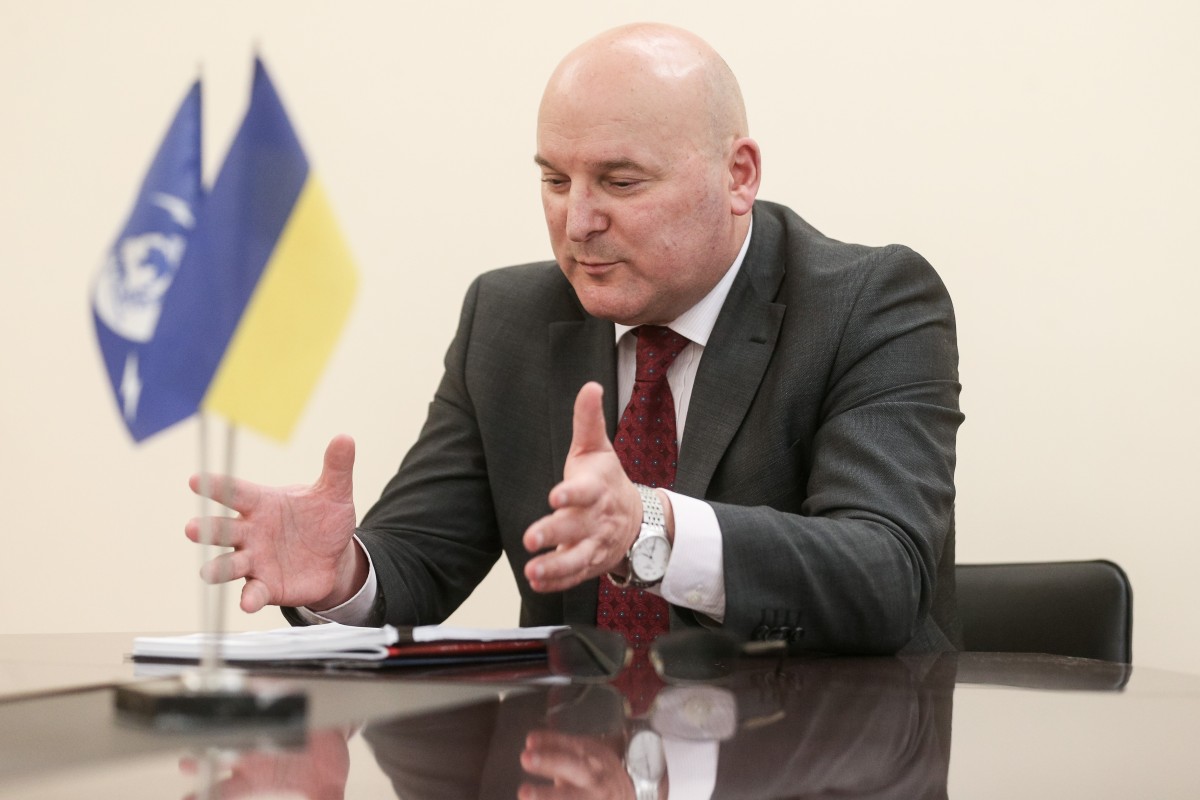
In general, the principle of our department and the organization as a whole is that each case is considered separately and each person is considered as an individual. And then, in the process of our work, we establish the status of these individuals.
Then let's talk about personas. For example, what about those involved in the case of the former chairman of the liquidated Ministry of Revenues and Assets Oleksandr Klymenko? Has anyone been found? Will we see them returned?
There were people found, and they were returned. But this is a matter of individual cases.
And how many of them are there?
I can only tell you the total number of people who are currently wanted on Ukraine’s initiative. It’s 2,763 people as of today, as we are speaking. And that’s regardless of their status.
Against how many of these people do Interpol apply a so-called "red" card?
2,016 people fall under “arrest and further extradition” warrant, 297 people – “location”, and another 450 are reported as “missing persons”...
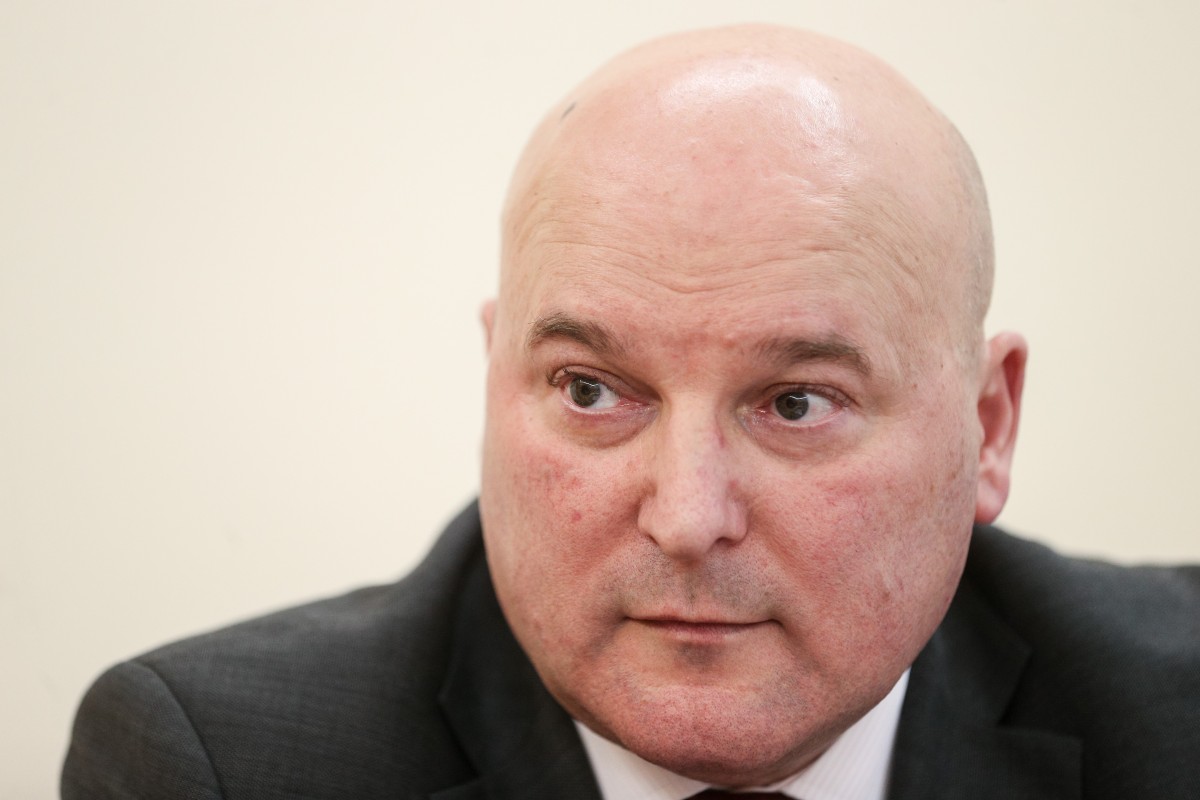
The search through the Interpol channels is the most well-known and high-profile way, and many people even consider it the only one available. But this is just one of the mechanisms and channels for locating an individual. We have certain principles that we try to follow in our work. There are not many basic ones – they are laid down in two articles of the organization's Charter. In short, Article 2 speaks of compliance with the principle of neutrality and investigation of cases only of a general criminal nature, in accordance with the Declaration on the observance of human rights. That is, the organization positions itself as a politically neutral and independent body, guided by general criminal law and a declaration of universal human rights. Article 3 deepens the understanding of what, in fact, this neutrality principle means. It’s about the fact that the organization is categorically prohibited from any interference in matters of political, military, religious and racial nature.
Do you mean that most cases of Yanukovych and Co. are of a political nature?
Recently, the method has become popular of claiming political persecution without thinking much, as soon as the question arises of criminal liability or search. Of course, if someone declares this, it doesn’t mean it’s, in fact, the case. But this claim must be verified because this is an argument to be studied and evaluated. Therefore, another principle is important - the organization adheres to an individual approach, that is, the case is studied separately, with regard to every complicit individual. The whole context is investigated in detail.
For example, take the Maidan cases. I have repeatedly had to explain why the Interpol Verification Commission refused to declare Yanukovych, Zakharchenko, Ratushniak, and others wanted persons. Whether we’re OK to admit this or not, but objectively, from the standpoint of an independent observer, all those events were taking place in the context of the political processes ongoing at the time. And these political processes were connected with the change of power. For experts who do not evaluate the situation from inside the country, but see it from the standpoint of an international organization, everything is actually quite clear here – it is a political process. Therefore, searching for people who held state offices, including in law enforcement agencies, like "Berkut" SWAT units, would not be a right thing to do in terms of the Charter and the organization’s data processing rules.
But if we want to bring these people to justice, can this be done somehow?
It can be done through other international cooperation mechanisms that may be employed. These are the bilateral mechanisms of the Prosecutor General's Office, or, perhaps, the creation of separate international institutions.
Let's talk about some fresher issues. Recently the Ukrainian media spun the news that a dossier of an infamous Ukrainian Judge Chaus appeared on the Interpol website...
I have not seen any announcements about his alleged inclusion into an international wanted list. There is some inaccuracy in these reports. After all, he has long been declared a wanted person internationally. At the same time, the fact of his detention in Moldova is another thing, of course.
Could you tell us, using this example, what the further procedure is like – between detention and extradition?
As a matter of fact, at the stage of establishing the whereabouts of the wanted person and their detention, the policing efforts end, as the police fulfilled their task: they established the whereabouts of a wanted person, detained them and placed them under custody, according to the legislation of a particular country... Then that person stands before court, and that the court decides whether to give consent to a pre-extradition arrest.
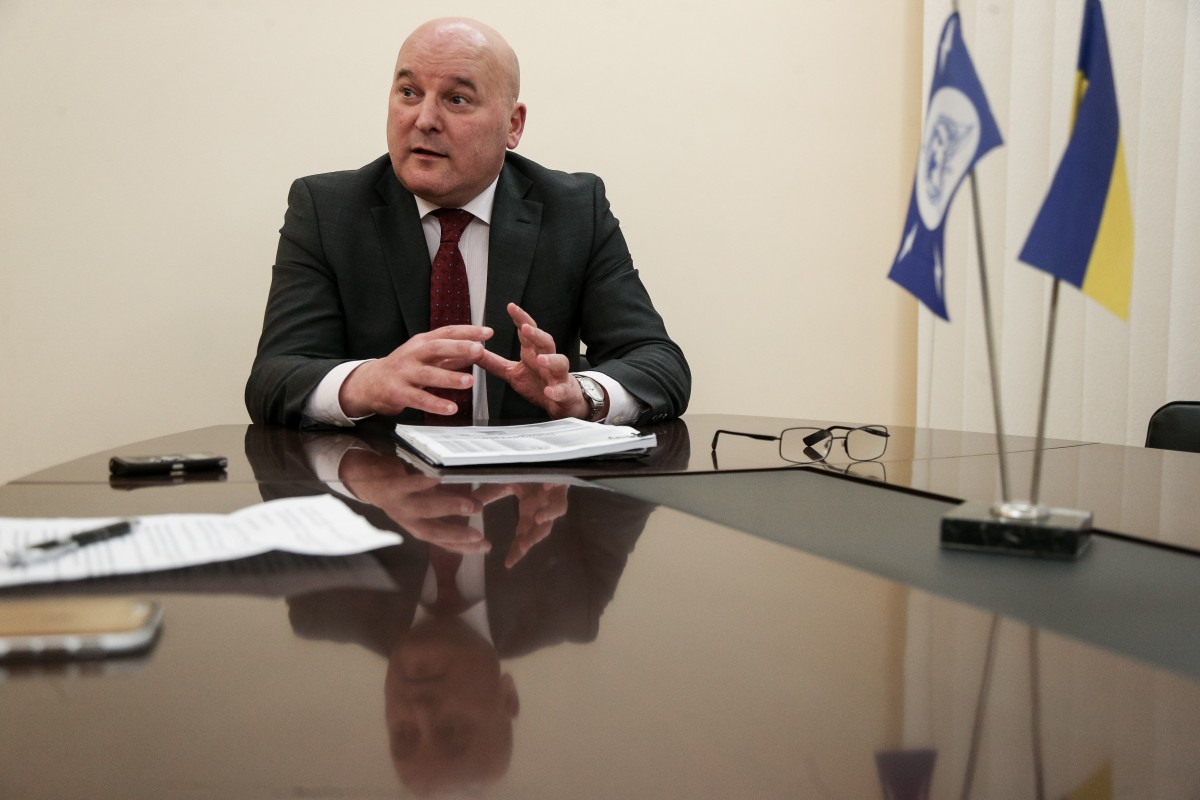
A pre-extradition arrest can be up to 40 days (usually, it’s shorter); it is a measure laid down in the European Convention on the Extradition of Offenders. It is required so that the requesting party could prepare the relevant package of documents and submit the package to the party who sealed the arrest. If the extradition initiator manages to file papers within this period, this term is no longer applied, and the actual extradition procedure begins.
Depending on different legislations, this period can continue for two, three, or six months; it could even take longer.
And what if the initiator fails to file the documents with the relevant evidence on time?
Then this becomes one of the grounds for the detainee’s release. But if the papers were submitted late, or if some new facts arise, this may once again be the reason for the detention.
Have there been any precedents when Ukraine failed to submit documents on time?
There have been very few of them. These are generally unique cases, and they are extremely rare. In my memory, it happens maybe once in 10 years.
But there have also been situations where a country refused to apply for extradition because of different legal circumstances. It also happened very rarely, but it did.
And what might be the reasons for refusing to have a criminal extradited if we had initiated the search, ourselves?
It sometimes happens so that at the stage when a person has been detained and the material is being studied before its submission to a relevant country, it turns out that there are some gaps in the investigation or insufficient evidence. Then a corresponding reasoned message is being prepared that we will not request extradition.
And what if the documents for extradition have been collected and submitted on time?
If the extradition papers are received in a timely manner, the very process of extradition begins. But again, a decision may be made either to satisfy the extradition request or to reject it (for various reasons). In the case where the request is satisfied, the technical stage begins.
The extradition decision is made by various instances, the so-called competent authorities. In Ukraine, we have the Prosecutor General’s Office and the Ministry of Justice. Once a decision is made, an order is given, for example, to the police, to technically ensure the implementation of this decision. And then, armed with this mandate, we, the police, negotiate with our partners in another country, where exactly (usually, it’s an airport), on what day, and at what time the detainee will be handed over. A group of guards is formed, which flies, under a relevant arrangement, to the country that has satisfied the extradition request, and the handover takes place.
Returning to Judge Chaus, at what stage is his case now?
The Moldovan side is now considering the evidence, grounds, and arguments provided by our side, to decide on satisfying or rejecting the extradition request.
You said that quite often the suspects try to portray their cases as politically motivated. But, for example, the case of Oleksandr Onyschenko is purely an economic one. Why has he still not been detained? Has your Department sent a request in his regard? At the moment, it seems that, despite being on the wanted list, he doesn’t seem to be bothered much.
In the context of the Onyschenko case, which was investigated by NABU [the National Anti-corruption Bureau of Ukraine], I must once again remind you of the Interpol’s mechanism for considering cases. In order to adhere to the principles of neutrality and political impartiality, Interpol has an appropriate structure. This structure includes an appropriate body, the Commission for the Control of Files. This is the body that deals with complaints from suspects in cases.
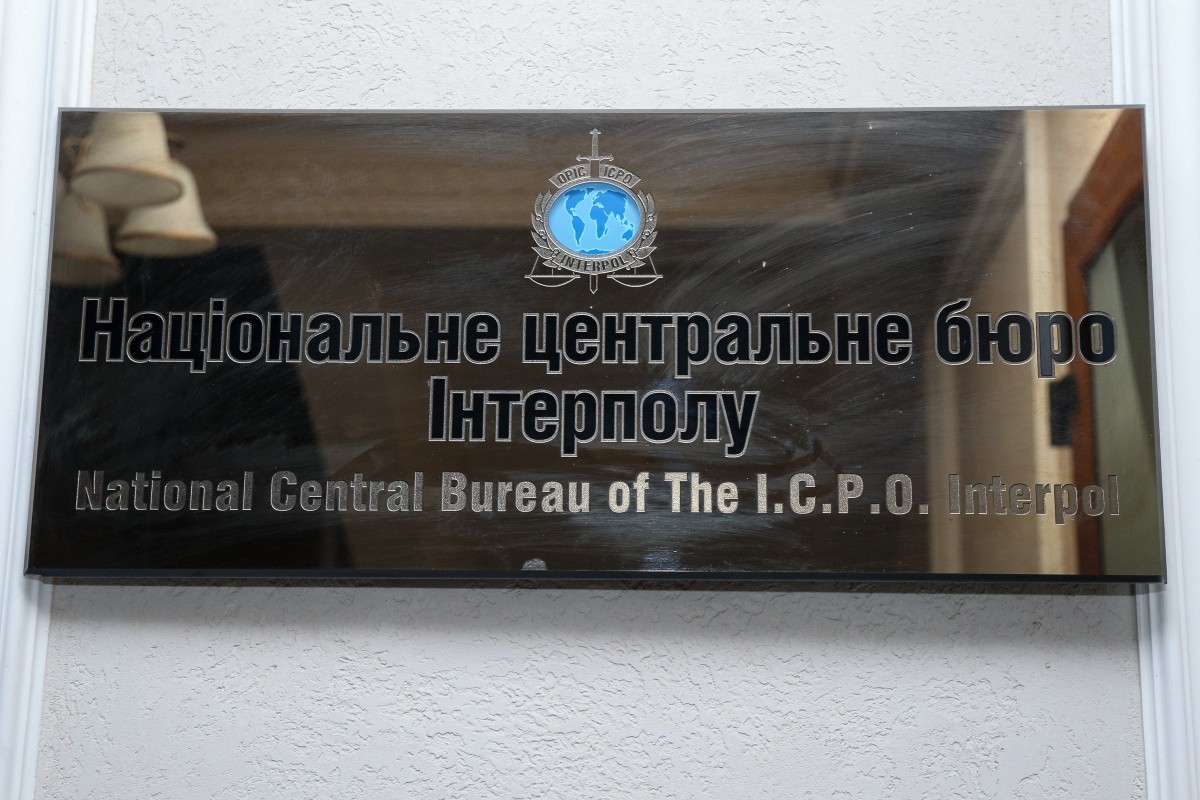
The Commission considers requests and statements by persons who disagree with the fact that they have been put on Interpol’s wanted list. And these people are fully entitled to do so. Although, as a rule, one of the first things they do is claim political persecution. At the same time, they can point at certain procedural moments, as well as the points concerning the proof of their guilt in a criminal proceeding.
In the case we are talking about, the Commission saw non-conformity of certain procedural moments...
Is about the procedures for the delivery of suspicion notice, things like that?
Let's not go deeper. These are moments related to procedural peculiarities and actions that had to be made, that have been made, but which do not comply with Interpol data processing rules.
This is the case that illustrates the Commission’s in-depth approach to studying each situation separately. I have no right to delve into comments on specific circumstances, but they are well known to our colleagues from NABU and the PGO.
That is, the Commission concluded that...
...the search via Interpol channels would not comply with the rules of the organization.
So, Onyschenko also can’t be returned to Ukraine through Interpol, right?
Regardless of the grounds, the essence of the decision [by the Interpol Commission for the Control of Files] is that the Interpol channels and mechanisms cannot be involved in the circumstances described in this material. If it is possible, then please use some other channels. This does not mean that, if there are any grounds for an appeal, or some other situation, we can’t apply to the organization again. It is possible to engage Interpol, but we will be obliged to provide new arguments. We cannot use anymore the ones they have already checked.
Another major economic case is against Dmytro Firtash. Who do you suggest has the priority right, if the decision on his extradition is taken? Will it be Ukraine, the U.S. or Spain?
We can only guess theoretically, based on general knowledge of the provisions of European conventions and bilateral agreements. Ukraine is not very much involved in this case; it’s solely in the context that he [Firtash] is a citizen of Ukraine. After all, it was not Ukraine who put him on the wanted list.
It is Austria, the country to announce the decision to grant or reject an extradition request that will decide whom to hand him over.
Let's imagine that both requests – from the United States and Spain - have seen a positive response (although this is doubtful). In general, if we are talking not about a Ukrainian citizen Firtash, but about a hypothetical citizen of some other country, on whom a positive decision is made, the question arises of competing for priority extradition rights. And here there are several criteria. First, it’s who was first to submit a request. Whoever applied first has an advantage. Second, it’s about crime severity. If one country wants the person extradited for committing a petty crime, while another country presses more serious charges, the person is handed over to the country where the more serious crime has been committed. But it’s up to the country where the person was detained to take the decision.
In the context of various economic crimes and putting relevant suspects on the the wanted list, the seizure of their property is also a matter of public interest. Who is responsible for the fact that in Europe, the assets of those who are wanted by Ukraine are not being seized? What is the mechanism of such work in general? Who should be dealing with this – is it the court, police, or some other body?
I can touch upon the topic just slightly because this is not always the task of Interpol and even the police. Property and seizure of property is a matter of separate procedures.
When a person is detained, the issues related to that individual and the issues regarding their property are immediately put on different sides. An individual faces the extradition procedure, while their assets require separate requests, separate appeals, and separate procedures for their seizure. This even applies to any belongings that the person had on them upon detention, not to mention their bank accounts and things like that. That is, the issue is addressed in a separate procedure and remains very complex.
Now the issue of multiple citizenship, which is forbidden in Ukraine de jure but exists de facto, has once again become quite relevant. What if a wanted person with, say, a dual Ukrainian and U.S. citizenship, is detained in a third country? Is there any probability of their extradition in this case?
I will try to explain this to you in the example of Ukraine. It is important for Ukraine and the vast majority of other countries to adhere to the provisions, which are usually enshrined in the Constitution, about the inadmissibility of handing over their own citizens. Ukraine does not extradite its citizens to other countries. Instead, we recommend that the country that wishes to extradite our citizen provide us with the relevant case files of criminal proceedings, in order to ensure that justice is served here, in Ukraine, in accordance with our national legislation.
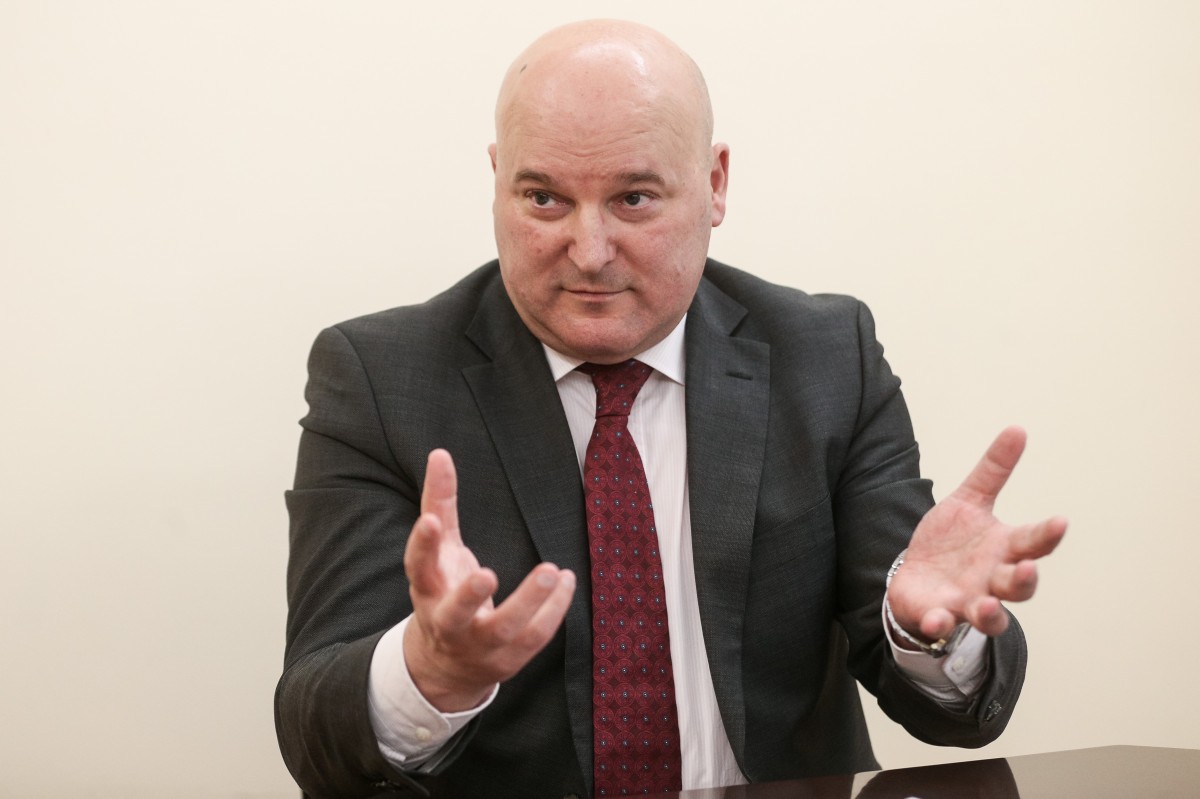
So it is important to find out that the person is not a citizen of Ukraine. And then it doesn’t matter, how many other passports they hold. It does not even matter whether they hold a passport of the country requesting extradition. The main thing here is that the person must not be a citizen of a country extraditing them.
Are Europeans studying the conditions of living in Ukraine for those persons whom Ukraine requests to hand over?
Such verification is possible and Interpol does it, but not in the process of studying the files by its units. It is done in the process of considering the issue of extradition. For example, we had a situation where Italy refused to hand a wanted man over to Ukraine, and one of the arguments was that the conditions in Ukrainian prisons did not meet certain standards, according to the person’s lawyer. This was not a decisive factor but this was one of the arguments voiced.
That is, everything is being studied in the process of extradition, since the extraditing country assumes responsibility for the further fate and conditions of the person's detention.
During our conversation, you have repeatedly mentioned that once new facts about a particular person appear, one can re-apply to put them on the wanted list again. Why don’t our law enforcers submit data with such facts on time? It seems that the search for certain individuals can last forever, while they keep posting pictures on social networks and make statements for the media...
This question is not entirely in my competence and it wouldn’t really be a right thing for me to comment on it. However, it is obvious that our operatives, while investigating cases within the existing legislation, are obliged to adhere to the Criminal Procedural Code of Ukraine. Besides, they must adhere with Interpol rules. Therefore, when there is another outcry about some individuals not being put on a wanted list, and this causing the end of the world, this is just not the case. See, in fact, Interpol is an organization that is not responsible for whether the person has been brought to justice or not. This is, first and foremost, the responsibility of the law enforcement agencies of a relevant country.
It is believed that Ukraine's requests filed with the Interpol Headquarters are blocked by Russia's representatives. Are these rumors of reality true?
I’ve heard such suggestions more than once. But this is just like claiming that Interpol allegedly unreasonably fails to put people on its wanted list. Moreover, there are claims that it’s because the Russians have penetrated the organization and keep blocking everything. In fact, this is not the case at all. The system of decision making and evaluation of the documents on putting persons on a wanted list does not allow anyone to take decisions individually. That’s irrespective of the citizenship of any employees at the organization.
One of the Vice-Presidents of Interpol really is a Russian citizen. But this does not mean that he is pursuing a policy of the Russian Federation, and has some levers to pursue this policy in the organization’s activities. I have already told you about the neutrality principle.
Secondly, the principle of the formation of the Interpol’s Executive Committee is balanced in a way so that the equality of representation of the continents and regions is maintained. It also ensures that its entire work is balanced and well-reasoned.
No country has any special "veto right". Every official who claims or holds a post in the organization, even a regular officer in the Secretariat, signs a so-called declaration of loyalty. It obliges them to become representative of the organization, not of their country, and to comply with the rules of the organization, not the recommendations by their government or other institutions of their country.
Nevertheless, there were some recent reports in the media that Russia is suspected of abusing Interpol mechanisms ... It turns out that some countries are actually trying to abuse them?
Yes, we are seeing this. This is a fairly well-known fact, and it is the subject of discussion not only within the organization, it was, periodically, the subject of the OSCE's debate; besides journalists from different countries are observing similar facts. It's about the problems of general misuse of Interpol tools. Since, if someone plots an abuse, such potential opportunity exists. But I want to emphasize that the organization is aware of this and takes active measures to avoid and prevent it.
That is why, now, first of all, the system of evaluation of documents, in particular, on putting someone on a wanted list, has become considerably tougher. Secondly, the relevant recommendations and decisions of the General Assembly are being adopted. And, thirdly, there is a group of countries that are not officially listed anywhere, but the OSCE files (you can find Russia, Kazakhstan, Ukraine, and the countries of Latin America there) who have once or recently attempted to abuse the Interpol system.
But, as I already said, there is also a general system of enhanced monitoring. That’s monitoring by certain criteria. For example, when a request is sent by Russia, this already means that it needs to be thoroughly verified. Quite often, our [Ukrainian] inquiries are also subject to such verification. This is all happening in the context of the general will by the organization to avoid situations where a certain country tries to abuse the system.
Is there cooperation between the bureaus of Interpol in Ukraine and Russia?
There is such cooperation. And now the Interpol channel remained virtually the only channel for the exchange of information with Russian law enforcers.
So if Russia makes requests that we hand over to then some ATO participants with Russian citizenship, will we extradite them?
We need to realize that the war with Russia (let’s call things by their names) is ongoing in various fields. Confrontation also exists in the field of law enforcement efforts. Therefore, when we talk about the ATO and participants of hostilities from both sides, we don’t facilitate their extradition or search. When we see that Russia is trying to declare someone wanted, for example, for some crimes in the ATO zone (on trumped-up charges or not), we, of course, refuse to cooperate.
But do they make such inquiries?
They do. They also send requests on Crimea. They have actually set up in Crimea a "branch" of their National Bureau of Interpol. We have brought this information to the attention of our Headquarters.
What are these Crimea requests about?
Look, Crimea is an occupied territory of Ukraine. Therefore, all actions taking place in this territory, from the point of view of our legislation, are illegal. That’s including putting anyone on Interpol’s wanted list by that "branch" or the Russian NCB of Interpol if the crime has been committed in Crimea. We consider such requests illegal and we cannot co-operate in these matters.
So, there is a possibility not to hand over a wanted person and not respond to Russian requests, is that right?
That’s right. Likewise, they do not respond to our requests.
We do have a mechanism not to hand over wanted persons. Including if a person is persecuted for political reasons, if the limitation period has expired for their prosecution, if the crime for which the person was detained is not punished in Ukraine by prison sentence, if there are any contractual obligations by Ukraine to other countries to not extradite people, or if a person has a refugee status...
There are enough legal grounds to reject requests from any country, not just Russia.
And does Russia inform Ukraine of its search warrants for Ukrainian citizens?
When I said that the Interpol channels were virtually the only ones left for exchanging information with the Russian law enforcement agencies, I meant that there used to be so many of these channels before. That’s starting with channels between regional departments and ending with those at the state level because Ukraine was a participant in the so-called Interstate Data Bank. That is, in addition to the search via Interpol channels, there was a search channel between our countries within the CIS. All information was accumulated in this organization. But when the fighting erupted, Russia immediately began to manipulate this Bank, because physically it is located in Moscow and is administrated, respectively, by Russian specialists.
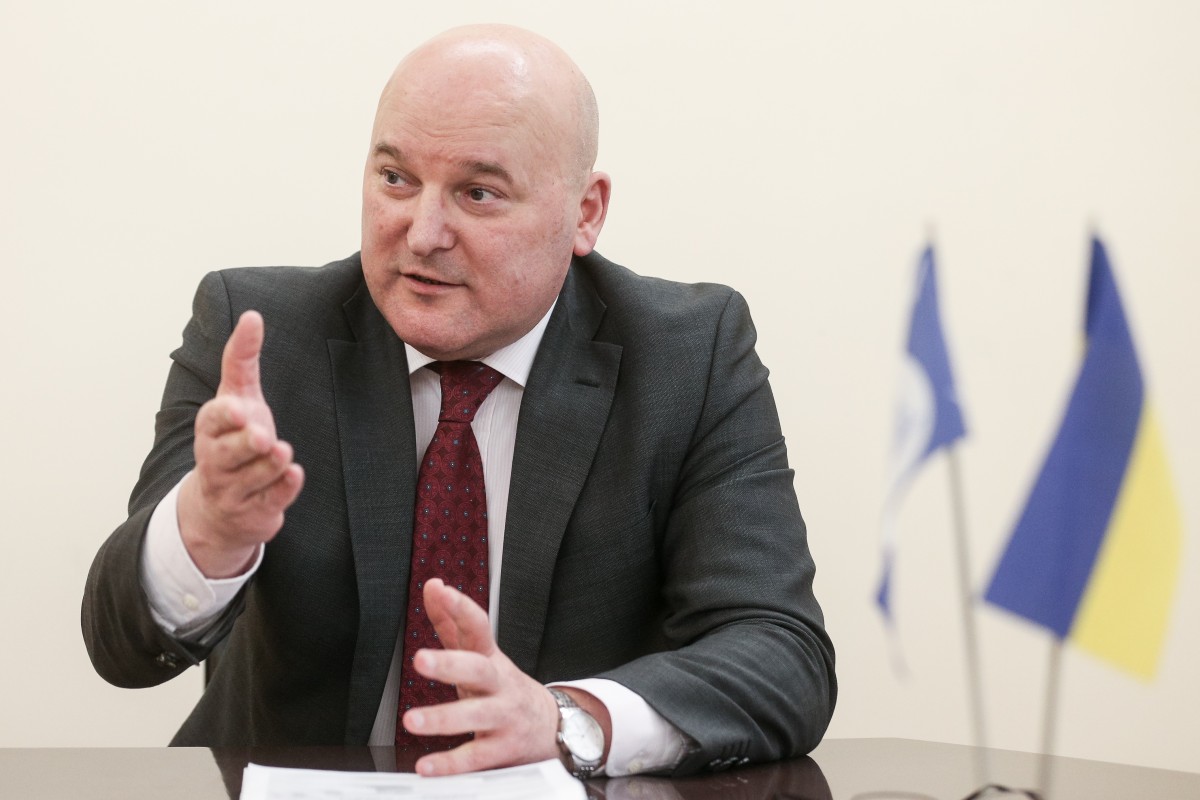
They began putting in this bank data on our military and civilians, whom they considered necessary to somehow restrict in their rights... And this was one of the reasons for the Government of Ukraine to withdraw from this bank and terminate any cooperation within the frameworks of the CIS structures. This decision was made back in February 2015, if I’m not mistaken, and since then we have not been aware of any data put in that bank.
That is, it’s impossible for Ukrainians who would like to find out whether they are on a Russian wanted list or not, isn’t it?
There are an internal national database and this one I mentioned, the international list. The National Police of Ukraine, as a state body, does not have access to these banks. Therefore, it is impossible to expect a citizen to apply somewhere and see if they’re on Russian wanted lists. Take Pavlo Hryb [a 19-year-old Ukrainian teenager, who disappeared in Belarus on August 24, and by September 7 he had been transferred to a detention center in the Russian city of Krasnodar and charged with terrorism], who went [to Belarus] and only after he was detained did he learn that he had been on wanted list.
So maybe it makes sense to completely break any ties with the Russian Federation? Why do we still have links with Russia’s Interpol Bureau?
First, both countries are members of Interpol. This is already the reason for continuing our interaction.
And, secondly, sometimes it has an effect and a positive result for us. For example, one of the recent cases was the arrest in Russia of a suspect in an attack on money collectors in Chernihiv [an attack took place in the fall of 2015, when three collectors were killed and UAH 15 mln in cash was stolen), and more recently – of a killer of the famous kickboxer Lashchenko. They were arrested in Russia, extradited to Ukraine, and prosecuted.
You just have to be careful here. Despite the fact that Interpol is a neutral and apolitical organization, we must be careful and watch out so that the Russian Federation does not manipulate this channel.
Whom has Russia extradited to Ukraine over the past 3.5 years? Whom have we extradited?
In January-September 2017, some 149 people were located by law enforcement agencies in the Russian Federation, while 72 persons wanted by Russian law enforcers were located in Ukraine. Besides, 36 wanted vehicles have been found in Russia and 33 – in Ukraine. A decision has been made and agreed on the transfer of 12 convicts from Russia to Ukraine.
Talking about extradition, over the said period, 11 people have been handed over from Russia to Ukraine, and four people - from Ukraine to Russia.
And how are things going with control at the border? Is it possible to immediately see if a person crossing the border is on the Interpol wanted list?
It is possible. This system has been installed since August 2015. We started this project (as a pilot) in August 2015, and today the exact number of checkpoints where the system operates is 157. It’s airports, checkpoints for cars, and pedestrian crossings.
The system is working, and it is quite effective. It is actually one of the main tools for performing the task of international search via Interpol channels today. That’s because many people who are crossing the border are not aware that such a system exists.
It works like this: when our border guard puts a passport in his reader, the request automatically goes to the database of the General Secretariat of Interpol in Lyon. If the search warrant is confirmed, the person is taken out of the passenger line and the second stage of control routine starts, that is an additional verification is carried out. If it is confirmed that the person is actually on wanted list, he is handed over to the police. Police and border guards inform us, and we proceed with further action.
And how often do the PGO, SBU or NABU turn directly to Interpol, bypassing the National Central Bureau of Interpol?
There are probably just a few attempts, and maybe this will also happen in the future. But this is only due to someone’s lack of knowledge of the Interpol system.
The structure of the organization is as follows: the General Assembly - the supreme body, the representative executive organ, then there’s the General Secretariat with a permanent office in Lyon, and then there are national central bureaus. In each country, they provide information exchange. And therefore the entire information stream is directed exclusively via these channels. But we cannot be aware of what any of our colleagues are up to.
But even if they file something bypassing us, then the response will go down through our Bureau anyway, so we’ll still see that there has been a request.
So, does this mean that Interpol accepts such requests from "outsiders", not from the national bureau?
Interpol might accept or not accept them. If it’s a minor request, it can be considered, but the response will be sent via our Bureau. This is a normal procedure. According to the rules, everyone who wants to use this mechanism should play by them.
And finally, could you, please, name the TOP 3 most prominent extraditions via Interpol to Ukraine and from Ukraine over the past year?
Well, there’s been a lot of them, really. I don’t rank them. Of those that I remember, besides the ones that I already named today, is the Shepeliev case [case of a former deputy of the Verkhovna Rada Oleksandr Shepeliev who was wanted by Ukraine on suspicion of intentional murder and grand embezzlement from Rodovid Bank]. We have recently extradited to the U.S. Mr Chalupsky, who was considered one of the top scammers [Vladislav Chalupsky was wanted for a number of crimes, including securities fraud and money laundering amounting to about $30 million]. Recently, the number of extraditions increases dramatically, as the system operates well on the border.
If you make a list and look at it, you can find a lot of interesting stories. But we just perceive it as our regular routine.
Tatiana Urbanskaya

